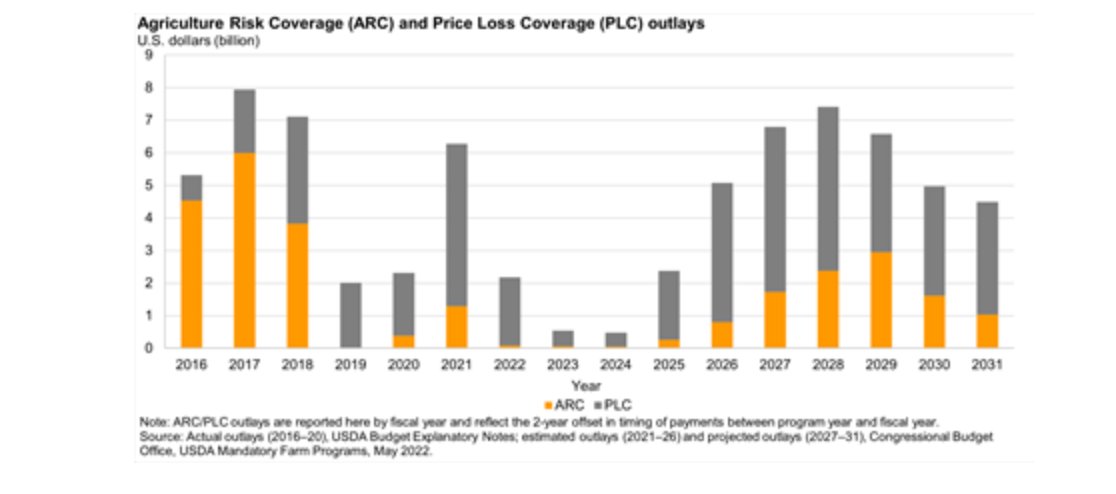
There is a zombie idea that just won't die and I am going to kill it with math.
If we put all our crop subsidies into fruit & veg, it WOULD NOT change the way Americans eat ONE IOTA.
Ok, maybe ONE iota, but not TWO.
Here's why, and it's MATH.
A cranky 🧵
If we put all our crop subsidies into fruit & veg, it WOULD NOT change the way Americans eat ONE IOTA.
Ok, maybe ONE iota, but not TWO.
Here's why, and it's MATH.
A cranky 🧵
Let's figure out how much money we're talking about!
The subsidies we have now go mostly to corn & soy. We'll include both insurance premium subsidies and what used to be called "direct payments" and are now called ARC/PLC.
The subsidies we have now go mostly to corn & soy. We'll include both insurance premium subsidies and what used to be called "direct payments" and are now called ARC/PLC.
The amount varies by year, but I think it's reasonable to say 11 billion for insurance and 5 billion for ARC/PLC.
Total amount to redistribute to fruit & veg:
$16 billion! A decent chunk of change.
ers.usda.gov/topics/farm-ec…

Total amount to redistribute to fruit & veg:
$16 billion! A decent chunk of change.
ers.usda.gov/topics/farm-ec…


Let's distribute that $16 billion over all the acres that grow fruit & veg (called "specialty crops" by the USDA).
That's about 15 million acres.
For the sake of having a nice round number let's say that means we have $1000 an acre for all fruit & veg.
nass.usda.gov/Publications/A…
That's about 15 million acres.
For the sake of having a nice round number let's say that means we have $1000 an acre for all fruit & veg.
nass.usda.gov/Publications/A…
Let's also assume 100% of that subsidy goes to reducing the price of the crop.
NONE to the farmer. NONE to the farmworkers. NONE to the distributors. NONE to the retailers.
ALL to us, the eaters.
How would that affect prices? Let's look at some examples.
NONE to the farmer. NONE to the farmworkers. NONE to the distributors. NONE to the retailers.
ALL to us, the eaters.
How would that affect prices? Let's look at some examples.
Example 1: BROCCOLI
An acre of broccoli produces about 16,000 pounds.
The subsidy would make broccoli 6 cents a pound cheaper.
(Other green veg will be in the same ballpark.)
An acre of broccoli produces about 16,000 pounds.
The subsidy would make broccoli 6 cents a pound cheaper.
(Other green veg will be in the same ballpark.)
Example 2: APPLES
An acre of apples produces about 20,000 pounds.
The subsidy would make apples 5 cents a pound cheaper.
(Other tree fruits will be in the same ballpark.)
An acre of apples produces about 20,000 pounds.
The subsidy would make apples 5 cents a pound cheaper.
(Other tree fruits will be in the same ballpark.)
Example 3: WALNUTS
An acre of walnuts produces about 5400 pounds.
The subsidy would make walnuts 19 cents a pound cheaper.
(Other tree nuts will be in the same ballpark.)
An acre of walnuts produces about 5400 pounds.
The subsidy would make walnuts 19 cents a pound cheaper.
(Other tree nuts will be in the same ballpark.)
But wait! Now that we've taken away subsidies for corn & soy, won't that make junk food MORE expensive?
No. Ingredients are 10-15% of the price of highly processed foods, and even those prices go up a full 10%, that's a 1% price increase.
washingtonpost.com/lifestyle/food…
No. Ingredients are 10-15% of the price of highly processed foods, and even those prices go up a full 10%, that's a 1% price increase.
washingtonpost.com/lifestyle/food…
Vegetables are WAY MORE EXPENSIVE to grow.
Growing a calorie of broccoli costs 50x more than growing a calorie of corn.
Subsidies CANNOT make up the difference.
PS: people mostly don't eat veg because they don't like them, not because they're expensive.
Growing a calorie of broccoli costs 50x more than growing a calorie of corn.
Subsidies CANNOT make up the difference.
PS: people mostly don't eat veg because they don't like them, not because they're expensive.
Redirecting subsidies would change veg prices by pennies per pound. It's just math.
It's downright silly to suggest that would change people's eating habits.
I REALLY want to change our subsidy system, but it won't change the way we eat.
Thanks for listening.
It's downright silly to suggest that would change people's eating habits.
I REALLY want to change our subsidy system, but it won't change the way we eat.
Thanks for listening.
• • •
Missing some Tweet in this thread? You can try to
force a refresh





